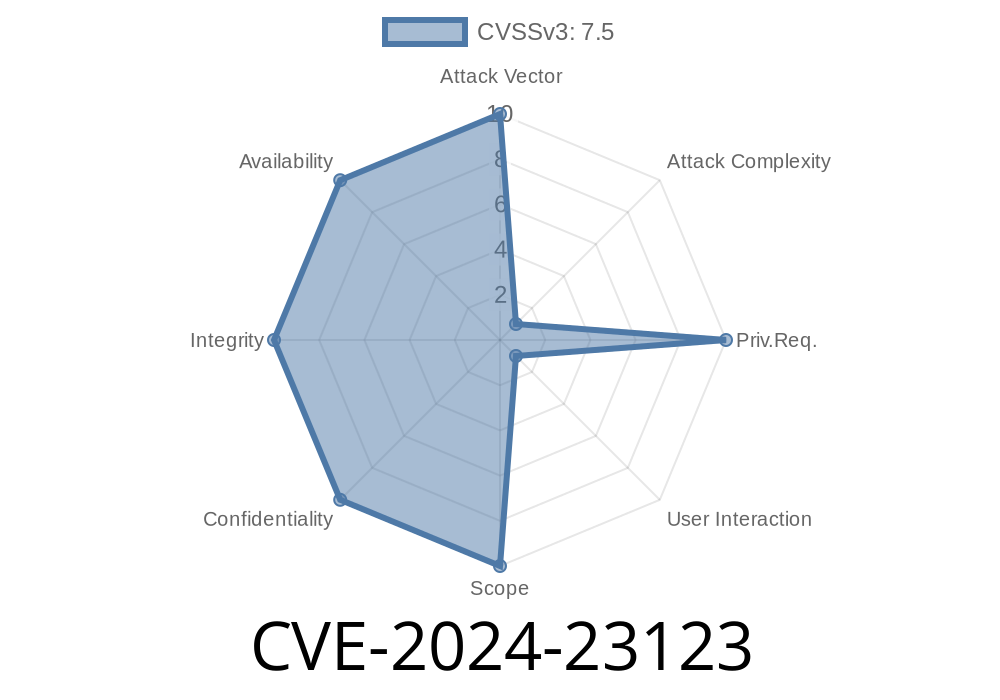Early 2024 has seen a swell of vulnerabilities targeting the software tools used in product design and 3D modeling. One notable risk is tracked as CVE-2024-23123. This post details what it is, the technical root, how an attacker could exploit it, and ways for users and admins to protect themselves.
What is CVE-2024-23123?
CVE-2024-23123 is a high-severity security flaw found in Autodesk applications that parse CATPART files (used mainly for 3D parts designed with Dassault Systèmes’ CATIA).
Key details
- A specially-crafted CATPART file can trigger an _out-of-bounds write_ when parsed by CC5Dll.dll and ASMBASE228A.dll, two DLLs in Autodesk’s toolchain.
- A successful attack can crash the application, leak private data, or even allow an attacker to run malware on the victim's system.
For the official advisory, see
- Autodesk Security Advisory APSB-2024-23123
- NVD listing
Let’s walk through how an attacker would use this bug
1. The attacker crafts a malicious .CATPART file that contains special binary data designed to overflow a memory buffer in the Autodesk parsing DLLs.
2. This CATPART file is then delivered to the victim, usually by email, cloud folder, or forced download.
The victim opens the CATPART file in an affected Autodesk product.
4. When parsing the file, either CC5Dll.dll or ASMBASE228A.dll does not properly validate certain fields and writes data past the end of a memory buffer.
5. If the attacker is clever, this memory corruption leads not just to a crash, but to arbitrary code execution: their payload runs as the user.
Demo: Simplified Exploit Skeleton
*Note: This is a conceptual code snippet for educational purposes only. The real exploit requires exact binary file structure knowledge.*
Let's imagine the vulnerable code is processing vertex arrays in a CATPART. A typical bug looks like
// In CC5Dll.dll (hypothetical)
void ParseVertices(const uint8_t* fileData, size_t fileLength) {
uint32_t vertexCount;
memcpy(&vertexCount, fileData, sizeof(uint32_t));
fileData += 4;
float* vertices = new float[vertexCount * 3];
// BAD: No check to ensure file has enough data for all vertices
memcpy(vertices, fileData, vertexCount * 3 * sizeof(float)); // <--- Out-of-bounds write here!
// ... further processing ...
}
An attacker would create a CATPART file where vertexCount is absurdly large, and then not provide enough data following the count field. That way, memcpy writes outside the vertices allocation, possibly overwriting adjacent control structures or pointers.
Here's a (simplified) Python code to craft a malicious CATPART header
# This just creates a malformed header; real exploitation is more complex.
malicious_vertex_count = 10**7 # Huge count
with open("exploit.catpart", "wb") as f:
f.write(malicious_vertex_count.to_bytes(4, "little")) # vertex count
# Not enough actual vertex data following
f.write(b'\x00' * 32) # Insufficient vertex info
If an Autodesk application trusted this header and tried to allocate/read for 10 million vertices, it would overwrite heap memory—prime ground for an attacker to trigger code execution.
Apply Autodesk patches:
Autodesk’s advisory says to update immediately to fixed DLLs.
Monitor for unusual behavior:
Unexpected Autodesk crashes, errors reading files, or new processes launching with Autodesk as parent may signal an exploit attempt.
Additional Reading
- CVE-2024-23123 at MITRE
- Official Autodesk Security Updates
- What is Out-of-Bounds Write? (OWASP Cheat Sheet)
Conclusion
CVE-2024-23123 shows how file format parsing remains a major risk, especially in software dealing with complex proprietary files.
Keep your software updated, use caution with files from outside your trusted sources, and teach users to avoid suspicious attachments—even if they're “just” 3D designs.
If you’re responsible for an Autodesk environment, treat patching as urgent. Attackers may target engineering firms, manufacturers, and research groups specifically.
Timeline
Published on: 02/22/2024 02:15:49 UTC
Last modified on: 08/01/2024 13:47:06 UTC
